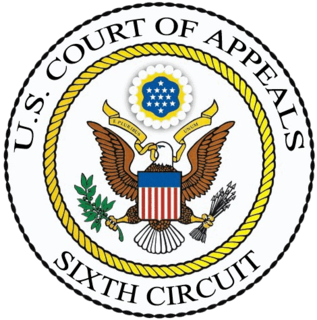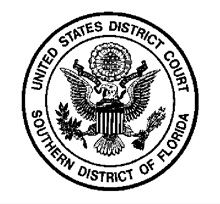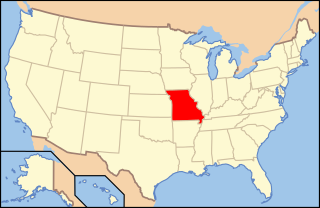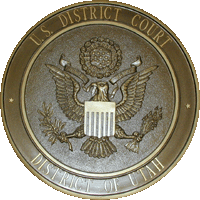Further research
- Sept. 11, 2013, "From Willowbrook to Myriad: Insights from Four Decades at the ACLU", Vanderbilt University
Christopher A. Hansen is an American civil rights attorney, notable for litigating many cases while at the ACLU, including the AMP v. Myriad Genetics (2013) case at the US Supreme Court and the ACLU's efforts in ACLU v. Reno (1997). [1] Hansen was at the ACLU for 40 years, from 1973 to 2013, retiring as Senior National Staff Counsel, and the ACLU's longest-serving attorney. [2]
Hansen graduated from Carleton College in 1969 and earned his J.D. degree from the University of Chicago. He joined the ACLU in 1973, working with its newly founded Mental Health Law Project.

The American Civil Liberties Union (ACLU) is a nonprofit organization founded in 1920 "to defend and preserve the individual rights and liberties guaranteed to every person in this country by the Constitution and laws of the United States". The ACLU works through litigation and lobbying, and has over 1,800,000 members as of July 2018, with an annual budget of over $300 million. Affiliates of the ACLU are active in all 50 states, the District of Columbia, and Puerto Rico. The ACLU provides legal assistance in cases where it considers civil liberties to be at risk. Legal support from the ACLU can take the form of direct legal representation or preparation of amicus curiae briefs expressing legal arguments when another law firm is already providing representation.
Reno v. American Civil Liberties Union, 521 U.S. 844 (1997), was a landmark decision of the Supreme Court of the United States unanimously ruling that anti-indecency provisions of the 1996 Communications Decency Act (CDA) violated the First Amendment's guarantee of freedom of speech. Two Justices concurred in part and dissented in part to the decision. This was the first major Supreme Court ruling on the regulation of materials distributed via the Internet.

The Child Online Protection Act (COPA) was a law in the United States of America, passed in 1998 with the declared purpose of restricting access by minors to any material defined as harmful to such minors on the Internet. The law, however, never took effect, as three separate rounds of litigation led to a permanent injunction against the law in 2009.

The United States District Court for the Eastern District of Virginia is one of two United States district courts serving the Commonwealth of Virginia. It has jurisdiction over the Northern Virginia, Hampton Roads, and Richmond metro areas and surrounding locations with courthouses located in Alexandria, Norfolk, Richmond and Newport News.

Myriad Genetics, Inc. is an American genetic testing and precision medicine company based in Salt Lake City, Utah, United States. Myriad employs a number of proprietary technologies that permit doctors and patients to understand the genetic basis of human disease and the role that genes play in the onset, progression and treatment of disease. This information is used to guide the development of new products that assess an individual's risk for developing disease later in life, identify a patient's likelihood of responding to a particular drug therapy, assess a patient's risk of disease progression and disease recurrence, and measure disease activity.
Stewart Richard Dalzell was a United States district judge of the United States District Court for the Eastern District of Pennsylvania.
Planned Parenthood of Central Missouri v. Danforth v. Danforth, 428 U.S. 52 (1976), is a United States Supreme Court case on abortion. The plaintiffs challenged the constitutionality of a Missouri statute regulating abortion. The Court upheld the right to have an abortion, declaring unconstitutional the statute's requirement of prior written consent from a parent or a spouse.

Stephen Joseph Murphy III is a United States district judge of the United States District Court for the Eastern District of Michigan.
Prison Legal News (PLN) is a monthly American magazine and online periodical published since May 1990. It primarily reports on criminal justice issues and prison and jail-related civil litigation, mainly in the United States. It is a project of the Human Rights Defense Center (HRDC), a 501(c)(3) non-profit organization.

Tania Simoncelli is Senior Advisor to the Director of the Broad Institute of MIT and Harvard. Prior to that position, she worked for two years as Assistant Director for Forensic Science and Biomedical Innovation within the White House Office of Science and Technology Policy. From 2010–2013, she worked in the Food and Drug Administration Office of the Commissioner. From 2003–2010, Simoncelli worked as the Science Advisor to the American Civil Liberties Union (ACLU), where she advised the organization on emerging developments in science and technology that pose challenges for civil liberties.

Nitke v. Gonzalez, 413 F.Supp.2d 262 was a United States District Court for the Southern District of New York case regarding obscene materials published online. The plaintiff challenged the constitutionality of the obscenity provision of the Communications Decency Act (CDA). She claimed that it was overbroad when applied in the context of the Internet because certain contents deemed lawful in some communities and unlawful in others will be restricted due to the open access of the Internet. The plaintiff also sought a permanent injunction against the enforcement of the obscenity provision of the CDA. The court concluded that insufficient evidence was presented to show there was substantial variation in community standards, as applied in the "Miller test", and to show how much protected speech would actually be impaired because of these differences. The relief sought was denied, and the court ruled for the defendant. The Supreme Court subsequently affirmed this ruling without comment.

American Booksellers Foundation for Free Expression v. Strickland, 560 F.3d 443, is a decision of the Sixth Circuit Court of Appeals involving a constitutional challenge—both facially and as-applied to internet communications—to an Ohio statute prohibiting the dissemination or display to juveniles of certain sexually-explicit materials or performances. The Sixth Circuit panel declined to resolve the constitutional issue but, instead, certified two questions to the Ohio Supreme Court regarding the interpretation of the statute. The Ohio Supreme Court answered both questions affirmatively and placed a narrowing construction on the statute. Since the Ohio Supreme Court's decision, the Sixth Circuit has not reheard the case.

Access Now, Inc. v. Southwest Airlines Co., 227 F. Supp. 2d 1312, was a decision of the United States District Court on 18 August 2002. It concerned the nature of Title III of Americans with Disabilities Act of 1990. The court determined that Southwest Airlines website is not a “place of public accommodation” as defined in Title III of the Americans with Disabilities Act of 1990. The case determined that the Southwest Airlines internet website was not in violation of the Americans with Disabilities Act of 1990 as Americans with Disabilities Act (ADA) concerned with a physical existence and hence cannot govern what it is in cyberspace. Judge Seitz also explained that the “virtual ticket counter” Southwest Airlines Co’s website was a virtual construct and hence not a “public place of accommodation” and as such “To expand the ADA to cover "virtual" spaces would be to create new rights without well-defined standards".

Lesbian, gay, bisexual, transgender, and queer (LGBTQ) persons in the U.S. state of Missouri as of late have most of the same legal rights as non-LGBT persons have, but nonetheless face some legal challenges not experienced by other residents throughout the state, excluding St. Louis, Kansas City, and Columbia. Same-sex sexual activity is legal in Missouri.
Meyer v. Grant, 486 U.S. 414 (1988), was an important decision by the United States Supreme Court on paid petition circulation. Colorado was one of several states with a process for citizens to propose initiatives for the ballot, which if passed became law. One of the requirements was to get the signatures of a significant number of registered Colorado electors. Colorado prohibited initiative sponsors from paying for the circulation of these petitions. The state argued this was necessary to "protect[...] the integrity of the initiative."

American Civil Liberties Union v. Miller was a court case in the United States District Court for the Northern District of Georgia in 1997 between the ACLU and Georgia governor Zell Miller. The case was an early precedent on the ability of individuals to use the World Wide Web anonymously.

Florence v. Shurtleff, Civil No. 2:05CV000485, was a case in which the U.S. District Court for the District of Utah issued an order stating that individuals could not be prosecuted for posting adult content that was constitutionally protected on general access websites, nor could they be civilly liable for failing to prevent access to adult content, so long as the material is identifiable by filtering software. The order was the result of a 2005 lawsuit, The King's English v. Shurtleff, brought by Utah bookstores, artists, Internet Service Providers and the other organizations challenging the constitutionality of certain portions of a Utah law intended to protect minors from adult content.
The Lawyers Military Defense Committee (LMDC) was a non-profit legal organization founded in 1970 by a group concerned that military members serving in Vietnam were unable to exercise their right to civilian counsel in courts-martial. LMDC existed for six years (1970–76) – two years in the combat zone of Vietnam, and for four years amidst disciplinary clashes inside US military forces in West Germany. During this period high caliber civilian representation and counseling by a cohort of young attorneys were provided free of charge country-wide, in often challenging and controversial cases for hundreds of service members, including scores of trial and post-trial proceedings. Initial logistical obstacles in Vietnam were ultimately resolved satisfactorily, so that communications with clients, other counsel, and the court could be accomplished pursuant to newly issued U.S. Army regulations, as were needs for access to military transport, billeting, and research facilities. In almost every instance representation by LMDC lawyers was welcomed by assigned military counsel. LMDC's operations in a war zone were unique. No undertaking of its kind has appeared in subsequent US conflicts.
Same-sex marriage in Missouri has been legal since the U.S. Supreme Court's landmark ruling in Obergefell v. Hodges, which struck down state bans on marriages between two people of the same sex on June 26, 2015. Prior to the court ruling, the state recognized same-sex marriages from other jurisdictions pursuant to a state court ruling in October 2014, and certain jurisdictions of the state performed same-sex marriage despite a statewide ban.
Association for Molecular Pathology v. Myriad Genetics, Inc., 569 U.S. 576 (2013), was a Supreme Court case that challenged the validity of gene patents in the United States, specifically questioning certain claims in issued patents owned or controlled by Myriad Genetics that cover isolated DNA sequences, methods to diagnose propensity to cancer by looking for mutated DNA sequences, and methods to identify drugs using isolated DNA sequences. Prior to the case, the U.S. Patent Office accepted patents on isolated DNA sequences as a composition of matter. Diagnostic claims were already under question through the Supreme Court's prior holdings in Bilski v. Kappos and Mayo v. Prometheus. Drug screening claims were not seriously questioned prior to this case.